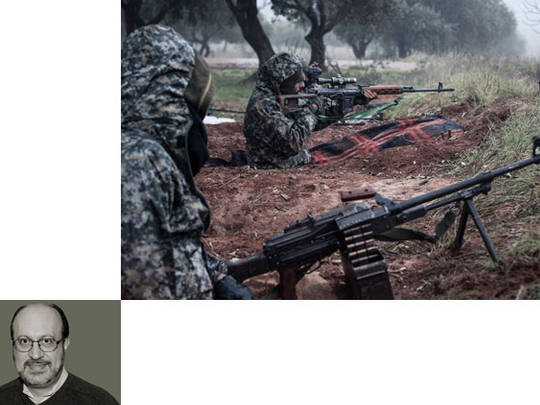
Defiant, confident and, regrettably, typical, President Bashar Al Assad telegraphed his intentions to continue his war against the Syrian nation. By rallying behind what’s left of his military, which was probably his primary audience, Al Assad called on Syrians to fight to preserve a system of government (Ba’athism) without mentioning it once. Another likely audience was Moscow, where challenged officials have finally signalled that Al Assad may be unable to defeat the insurgency and, not a negligible point, that Russia would welcome any country’s offer of safe haven for the head of state and his family even if it had no plans to make one of its own.
Caustically, Al Assad offered a new peace plan, which included a fresh cabinet, an updated constitution to replace the one approved in the February 26, 2012, referendum, and conditional talks with selected opposition groups who would disarm and recognise their errors.
He dismissed alleged foreign interferences, including mediation efforts of the joint UN-Arab League envoy Lakhdar Brahimi, stressing that “Syria accepts advice but not orders”, that hinted at tense negotiations between him and Brahimi. The affable Algerian said nothing in the days that followed the speech though UN Secretary-General Ban Ki-moon expressed his dismay that Al Assad could still justify attempts to force an entire nation to kneel to his whims, declaring that the Damascus Opera House oration failed to contribute “to a solution that could end the terrible suffering of the Syrian people”.
Naturally, Al Assad ruled out negotiations with the Free Syrian Army — identifying them as terrorists — as well as the Muath Al Khateeb-led National Coalition for Syrian Revolutionary and Opposition Forces (NCSROF), which called for the president’s removal. He also ignored global demands to step down, which ensured that his proposals were categorically rejected, except for an official Iranian declaration uttered by foreign minister Ali Akbar Salehi who alleged that the Syrian had rejected violence and offered a “comprehensive political process” to end the conflict. Russia and China were more conspicuous, and both were likely to be further embarrassed, now that repeated UN vetoes lost most of their value.
Whether labelling Syrian revolutionaries “terrorists and traitors” will limit defections and rally the troops was impossible to determine, though this categorisation revealed that the Ba’ath system effectively produced a lot of “terrorists and traitors”. More important, it was difficult to ascertain whether Damascus was aware of actual events on the ground, or whether it was oblivious to ongoing massacres.
In fact, the president’s assertions that the Syrian revolution was driven by “murderous criminals” financed by rivals such as Saudi Arabia, Qatar and Turkey, all under the direct supervision of leading Western powers, further polarised the Syrian nation. “Who should we negotiate with — terrorists?” asked the Syrian president, who answered his own question by hammering: “We will negotiate with their masters,” presumably meaning Washington, London and Paris. Be that as it may, the president was open to dialogue with “those who have not sold Syria to foreigners”, although his road map did not mention how authorities would regain control over large parts of the country, which were no longer under its hegemony.
Still, one wondered whether references to opponents as terrorists were an improvement over 2011 interviews, when he labelled revolutionary elements as microbes (jarasim). What was evident was that Al Assad abandoned the Muammar Gaddafi script — the Libyan majestically called his people “rats” (jaradin), though it was he who ended up hiding in sewer pipes before he was shot — though the cleaning process in his latest proposal skirted tough political reform strategies.
Mistaken assumption
Although Bashar Al Assad appeared in front of a collage of some of the thousands of military personnel who perished during the past two years, there was no mention in Sunday’s address of the thousands of civilians who died or of the destruction that decimated most Syrian cities, one neighbourhood at a time. Syria will soon enter a third year of war unless revolutionary forces manage to mobilise additional elements in the armed forces to switch sides. Short of an unlikely foreign intervention, the reflection of internal economic and political tensions in leading Western capitals, along with a mistaken assumption that so-called religious fundamentalists were about to conquer the entire Levant, the destruction was sure to proceed full-speed ahead.
The regime banked on this scare tactic that allegedly lured jihadists galore to assemble in Syria against a dictator, which ignored that a few hundred foreign fighters represented a tiny portion of the millions who simply wished to turn the Ba’ath page in their country’s contemporary history. Moreover, it was worth remembering that Damascus did not refrain from facilitating the movement of some of the same jihadists during the 2003 war in Iraq, though their impact on that conflict did not result in the creation of a fundamentalist government in Baghdad.
Despite Al Assad’s rhetoric, Syrians were not afraid that fundamentalists would conquer the country, though they may have little choice but continue to die in order to secure their freedoms. Dictators like Saddam Hussain, Muammar Gaddafi or Bashar Al Assad, whose raw motives for wealth and power can be easily understood, seldom concede but, in the end, all of them take “orders” from their respective nations.
Dr Joseph A. Kechichian is the author of Legal and Political Reforms in Saudi Arabia.









